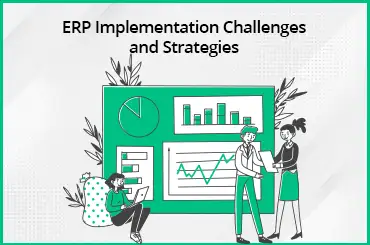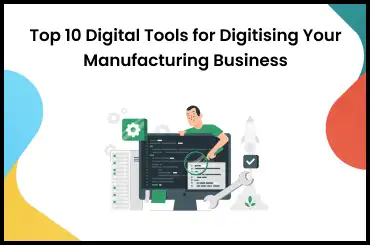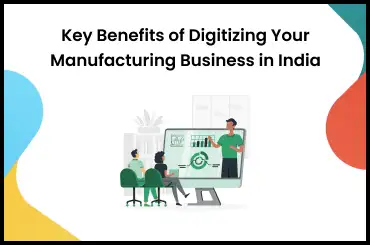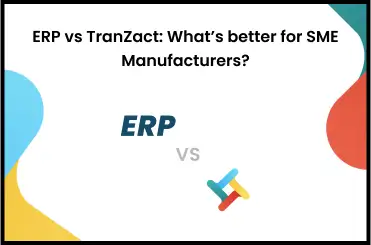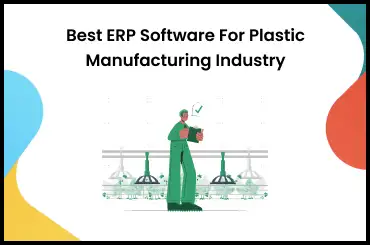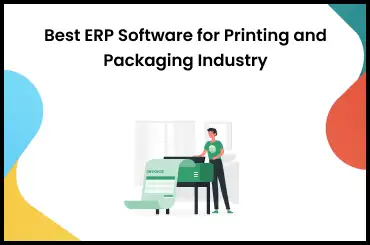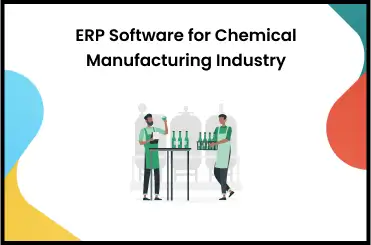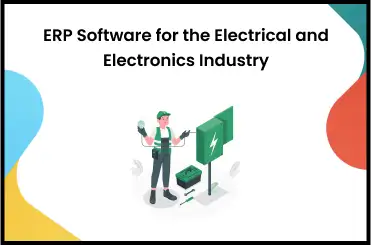Before we go on to discuss ERP components, let's first understand ERP and why it is a must in today's business scenario. In today's fast-changing world, you must take advantage of technological innovations like ERP software or Enterprise Resource Planning Software.
ERP systems with their various ERP components ensure that all the business departments function well and are well-coordinated. Some benefits include seamless functioning, better performance, more efficiency, data integrity, data security and better decisions.
So, when these benefits can be availed with different components of ERP systems why not implement ERP in your business? In this article, we will explain ERP system architecture, core ERP components, how they work , and more, to help you decide better.
ERP System Architecture
To understand the functioning of ERP, it is important to understand the ERP architecture. Enterprise Resource Planning (ERP) system architecture is nothing but the way its technical components are arranged for the management and flow of business processes. ERP architecture makes use of a central server to provide information that is useful for company managers or workers across locations.
Poor ERP architecture can result in inaccurate data you won't be able to make sense of and hence is useless for business owners or department heads. Sound ERP architecture also ensures smooth ERP implementation as it divides the ERP system into various components by departments.
ERP architecture has three layers as discussed below:
- Presentation layer: The presentation layer that is on the client's computer.
- Application layer: The application layer carries out instructions from the users and also helps in passing on and obtaining data from the database.
- Database layer: The database layer manages the data centrally using a central server.
The ERP architecture helps to increase profits and reduce losses by looking into every perspective of the business by means of the different ERP components. Let's next understand the various ERP components and how they streamline business departments and the business in totality.
Core ERP Components
The components of the ERP system basically focus on all the key areas that include business procedures, work efficiency, and cost savings. We have explained them in detail as below:
Finance and Accounting
If you are a business owner, you would agree that finance and accounting management is the most important aspect of any business. If finance is not handled well, the business will surely shut down sooner or later.
The finance component of the ERP system is divided into financial modules, such as general ledger, accounts payable, accounts receivable, fixed assets management, budgets and forecast.
If you look at the benefits of this module, you will know why the ERP finance module is a must in any ERP system. It automates the financial processes along with revenue and expenditure management.
Also, when it comes to disclosing the financials to stakeholders, vendors, and other parties, ERP makes things easy and transparent. Human errors become the things of the past, and you can do planning and budgeting based on useful insights and reports. Organizing financial data and documents becomes as easy when everything is saved securely in one centralized location.
Supply Chain Management
If the supply chain of any business is in chaos, it is not hard to imagine what it would lead to. So, as a business owner, the next key aspect that needs your attention is supply chain management, which is another core ERP component.
It covers a wide range of activities that include the acquisition of raw materials and churning them into intermediate products and from there on the final product that the company wants to sell in the market.
The supply chain management module modernizes the manufacturing and distribution processes by accumulating real-time data. Capturing real-time data is extremely effective as it fixes issues as they happen instead of fixing them after they have happened. This makes the production plan accurate and up-to-date right to the exact moment. They help to give better profits because of the accountability due to:
- Maintenance of inventory.
- Management of purchase orders.
- Fruitful planning of the supply chain.
Human Resource Management
Since employees are the pillars of all business enterprises, a business cannot perform well without managing them well. Thus, this ERP component forms the core of the ERP system. Using this module, companies can benefit from the automation of the employees' payment system and taxes payments, generation of performance reports, employee attendance tracking, promotions alerts, and calculation of work and holiday hours. It also stores all the personal information and contact details of employees.
In a nutshell, the HRM module helps with employee onboarding, off-boarding, recruitment, and gauging of performance. Thus, it simplifies managing people who are the most important asset.
Customer Relationship Management
Since every business is wholly dependent on its customers, as a business owner you need to pay attention to this aspect. So, having a properly managed customer relationship ensures they are happy, and ultimately you are happy when your return on investment increases.
So, Customer Relationship Management (CRM) is yet another core module of ERP. It works by managing the leads, tracking customer satisfaction quotient, and keeping track of all the customer communication so that there is no gap.
Additional ERP Components
These are secondary ERP components that a company needs for superior growth and progress. So here is a small read-through of these components.
Business Intelligence and Reporting
Business Intelligence (BI) is a must in today's business world where there are huge amounts of data and information related to business. This module makes use of tools like business analytics and data visualization to allow organizations to take informed decisions.
Although a secondary ERP component, BI and reporting are vital where you as the owner have full knowledge of your employees and the daily functioning of the business. By using this component, your data collection is effective and efficient. This provides insights into the business and helps you as an employer to make decisions suitably.
Project Management
With so many key aspects taken care of, you now need to make your business a success by managing all the projects meticulously. So how do you do this?
To manage a project well there should be the implementation of proper planning, control, budgeting, resource allocation, and visibility over the whole project. This is solely possible due to the ERP component of project management. It gives total information regarding a project that makes the project a success.
It helps to consolidate the resourcing, finance, and project data in one place that helps to proactively manage the project and steer it to success.
Empower Your Business for Success With ERP Components
Various ERP components in their totality act as powerful tools that propel a company to succeed. These will give your business the leverage and boost you are in search of.
ERP does not just streamline processes and store data at a centralized location, but it also adds value by improving business performance and eventually profits. So, if you want to take your business to the next level, embracing manufacturing ERP components that meet your business needs is a must.
TranZact offers advanced cloud ERP solutions but also does a lot more than any ERP. It helps streamline sales, inventory, production and business intelligence, all on a centralized dashboard for rapid business growth.
FAQs on ERP Components
1. How does an ERP system help in making better business decisions?
An ERP system can forecast and predict problems at each stage and in different ways in different modules. This ability helps the company rectify and make use of these predictions to solve problems and achieve success.
2. How does an ERP system help in managing projects?
ERP systems help in managing projects by integrating the data collected through the system and integrating and incorporating it all into the business. This transforms the project by giving it a 360-degree view that is required for the success of any project.
3. What are the benefits of using an ERP system for financial management?
Some key benefits include centralization of financial data, enhanced accuracy, useful reports, speeding up of processes, seamless management of financial functions, and transparency.
4. How does an ERP system help in managing customer relationships?
The CRM component of ERP helps to understand the buying behavior of the customers, and this in turn helps to push sales and increase revenue for the company. Ultimately, this helps to enhance customer relations and build loyalty.
5. What are the benefits of using an ERP system for HR management?
Human Resources or HR management in ERP can help to streamline HR processes such as recruitment, onboarding, benefits administration, payroll, and performance management. This can lead to increased efficiency and productivity.
6. How does ERP system help in managing inventory?
Inventory management in ERP is done by keeping a tab on order fulfillment management and maintaining the stocks in the warehouse. Inventory module in ERP also helps to monitor stock movements and provide better inventory control for the business.








